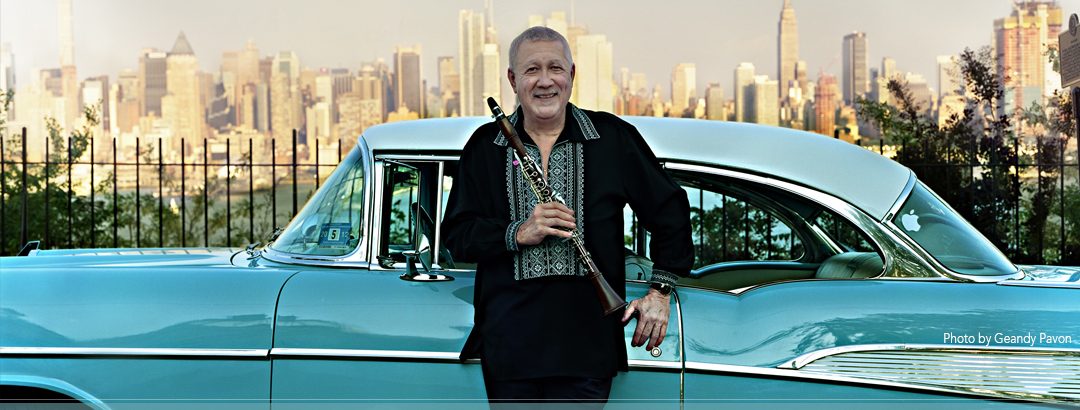
Paquito D’Rivera
Recording Artist, Composer, Soloist, Jazz Master
Paquito D’Rivera defies categorization. The winner of fourteen GRAMMY Awards, he is celebrated both for his artistry in Latin jazz and his achievements as a classical composer.
Born in Havana, Cuba, he performed at age 10 with the National Theater Orchestra, studied at the Havana Conservatory of Music and, at 17, became a featured soloist with the Cuban National Symphony. As a founding member of the Orquesta Cubana de Musica Moderna, he directed that group for two years, while at the same time playing both the clarinet and saxophone with the Cuban National Symphony Orchestra. He eventually went on to premier several works by notable Cuban composers with the same orchestra. Additionally, he was a founding member and co-director of the innovative musical ensemble Irakere. With its explosive mixture of jazz, rock, classical and traditional Cuban music never before heard, Irakere toured extensively throughout America and Europe, won several GRAMMY nominations (1979, 1980) and a GRAMMY (1979).
His numerous recordings include more than 30 solo albums. In 1988, he was a founding member of the United Nation Orchestra, a 15-piece ensemble organized by Dizzy Gillespie to showcase the fusion of Latin and Caribbean influences with jazz. D’Rivera continues to appear as guest conductor. A GRAMMY was awarded the United Nation Orchestra in 1991, the same year D’Rivera received a Lifetime Achievement Award from Carnegie Hall for his contributions to Latin music.
In 1999, and in celebration of its 500 year history, the Universidad de Alcala de Henares presented Paquito with a special award recognizing his contribution to the arts, his humane qualities, and his defense of rights and liberties of artists around the world. The National Endowment for the Arts website affirms “he has become the consummate multinational ambassador, creating and promoting a cross-culture of music that moves effortlessly among jazz, Latin, and Mozart.”
Paquito D’Rivera is the author of two books: My Sax Life, published by Northwestern University Press, and a novel, Oh, La Habana, published by MTeditores, Barcelona
For additional information please visit:
– https://paquitodrivera.com
The Art Of The Jazz Clarinet
How To Become An Acclaimed, International Jazz Celebrity
Why did you choose music as your career?
My father was a classical saxophonist and a little instruments and printed music importer. He never had the ability to improvise, but he loved Lester Young and Stan Getz (I don’t blame him for that) So I was exposed to all kinds of music since a very early age.
Did you ever want to give up on playing music?
Nooo!!..Why?…The only thing I love more than music is black beans and rice.
Where you classically trained then switched to jazz and commercial music?
There are only two kinds of music: Good music and “the other stuff”, said Ellington.
On days when you are not performing or rehearsing how long do you practice for?
I’m not good for practicing, and that’s not a good advice for young music students. I rather play with my classic cars while listening to Ravel or Jobim.
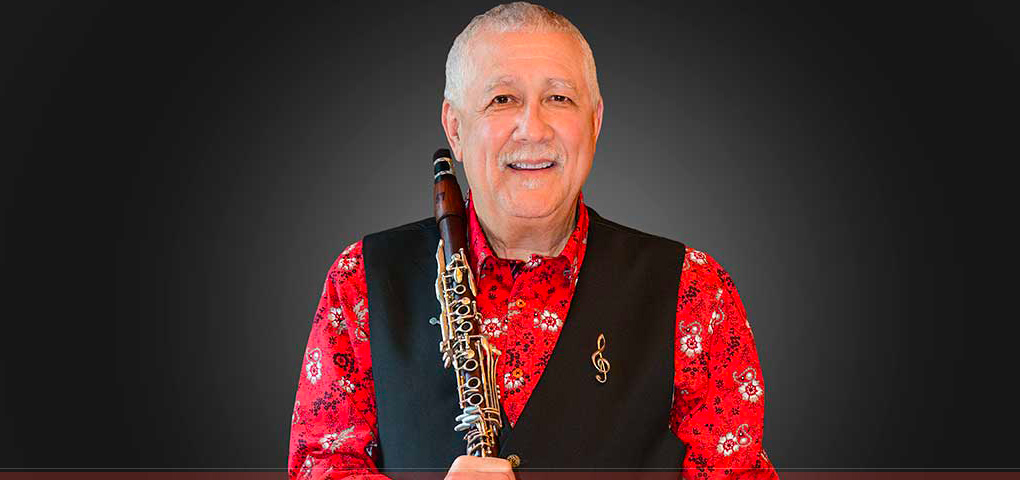
What do you mostly work on when at home practicing?
Hard pieces that I have to prepare for the near future. Like recently when I have to play the Carl Maria von Weber quintet for clarinet and strings with the Harlem String quartet.
How long where you studying/playing jazz before your solos started sounding cohesive and professional?
I don’t remember that!
What kind of scales and patterns do you practice?
¡¡¡????
When you are improvising are you thinking about scales or are you simply playing melodies and ideas that are playing in your head?
I’m a very spontaneous improviser, so very seldom I think in theory terms. Some players like the extraordinary tenor-man Eric Alexander knows how to explain technically every note him or someone else plays. I can’t.
When soloing, do you have the chord changes memorized or do you simply have an idea of shapes and colors of the tune?
A combination of all of that and other elements. Some of my best, fresh solos I did reading the changes. Like my recorded solo on Michael Camilo’s Big Band arrangement of Caribe.
Do you ever run out of ideas when playing a solo?
Some days you are more creative than others, but in any case, when you are a professional improviser, you always have some useful material in storage. You must!
Are you normally not really concerned with the actual chord changes?
Only when I play on free forms. Free Jazz and stuff.
Do you write some ideas for the solo before heading to the studio?
Never.
Do you prefer to play with your own band or with other groups?
Both. Is like eating the same thing every day.
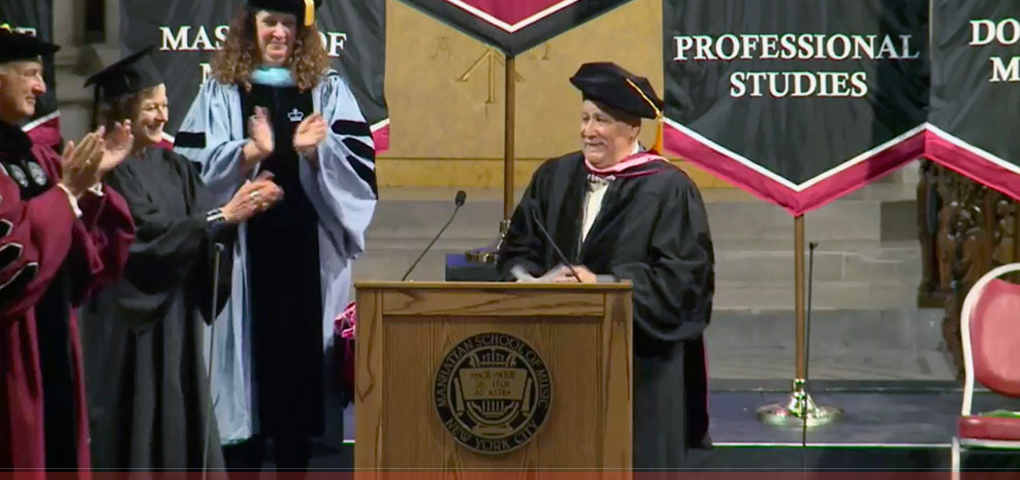
Do you approach your playing any different if you are playing with your big band as opposed to as a soloist in somebody else’s group?
Never thought of that, but I guess you have to adapt yourself to each occasion.
Who do you listen to for inspiration?
My tastes are pretty diverse, so it’s not easy for me to answer that with a short statement. Depending on the day, I might listen to anything from Stevie Wonder to Ravel. I also enjoy checking out what younger musicians are doing. There is some really dynamic and interesting music out there these days.
Do you enjoy teaching or do you prefer to be out recording and playing instead?
I feel that one very often informs the other.
When recording, do you go for the first solo or do you do a few takes of the solo until you are happy with the result?
With exceptions, most of the time, the first one is usually the best.
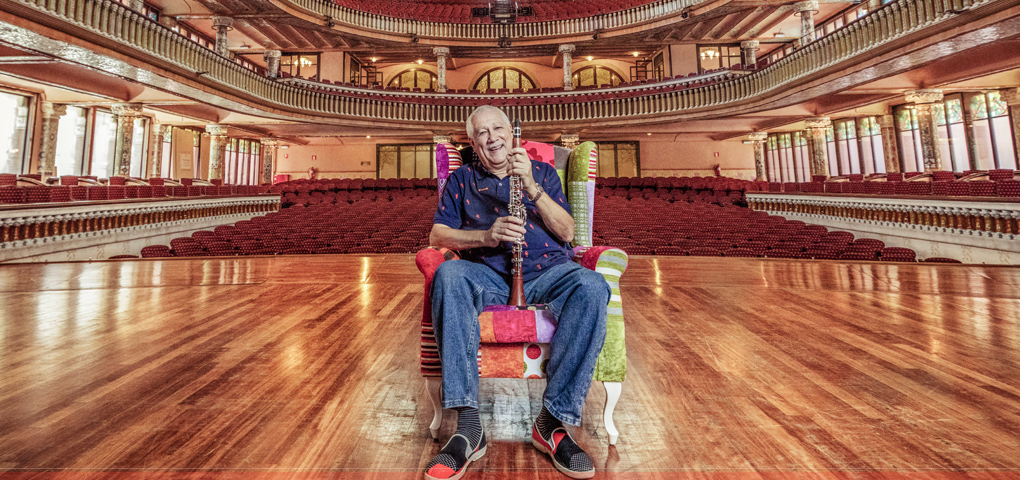
What equipment are you currently playing?
I am a YAMAHA artist, so my alto is a Custom model (black lacquer), a YSS62 Soprano and a Chilean rosewood L. Rossi clarinet. I play a Claud Lakey mouthpiece on the alto, an old Selmer letter D on the soprano (my first mouthpiece since 1953), and a Heinz Viotto (Berlin) Paquito’s model on clarinet. All of them with Vandoren reeds #3. (White Master cut on clarinet)
Do you select different equipment depending on the group or what the job calls for?
Yes indeed. Specially on the alto sax, when I play with chamber groups, singers or strings, I use an old hard rubber Selmer E, more compatible for mellower formats than the Lakey Jazz mouthpiece.
How much time and effort do you put into composing?
Mostly by commission, like now that I just completed my “Concerto Venezolano”, for the great classical trumpeter extraordinaire Pacho Flores, to be premiered by the Valencia symphony at the end of this year.
When composing do you work out a progression then a melody or does the melody come first?
I don’t have a pattern or a system for composing. It comes out always in different ways.
The Rebirth Of The Jazz Clarinet
Do you have a formula you follow when working on new compositions?
No, I pretty much feel like a Jazz improviser when composing all written music for an orchestra or chamber group.
Do you do the arrangements for your own compositions or do you delegate that to someone else?
I do the entire thing when I write for classical ensembles, although sometimes other arrangers organize my Jazz themes. And I love that, because you see what other talented people do with your melodies. People like Hilario Durán, Manuel Valera, Bill Dobbins and Chico O’Farrill for example.
Of all your compositions, is there one that is your all-time favorite?
My “Aires Tropicales” for Woodwind Quintet, commissioned in the eighties by the Aspen Woodwind Quintet.
How much time and effort did it take you to complete your latest album?
All of them are so different in terms of planning time, arranging, etc…
Now that you are an established soloist, what is your biggest career challenge?
This profession is like an adventure voyage across the Amazon. Every day is a challenge. You never know what to expect, but I love it!!
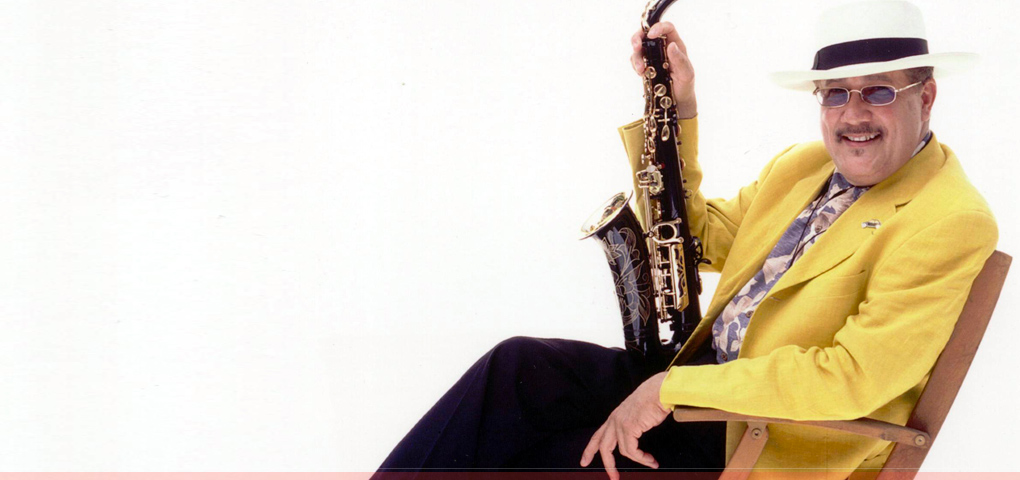
Serious music students use your solos as part of their learning tools, how do you feel about that?
I’m happy to see that my work has served a good cause by helping others to achieve their goals in music.
Did you ever imagine your solos would have such an impact on others?
Hhmmm…not really. I just do my work (to call it some way) and if my solos might be of some inspiration for others, I’m happy.
Best advice you would give to an upcoming player?
There is NO business like show business.
Best tip for anyone learning the art of improvisation?
I learned improvising by playing along with Benny Goodman and latter Paul Desmond and Charlie Parker’s recordings, and then trying to make my own phrases by ear, even without having any knowledge of harmony or anything like that. Just blow man, blow!!
Why do you think there are so many incredibly talented musicians from Cuba?
I have no idea. From Ignacio Cervantes, Ernesto Lecuona, César Portillo, Mario Bauzá, and Bebo Valdés to his son Chucho, Manuel Valera, Carlitos Puerto, Alfredo Chacón, Hilario Durán and so many others, the island of Cuba produces an incredible array of creative musicians pretty much in demand around the planet since the late XIX century to the present days. What can I tell ya?!..(it’s not my fault…)
Growing up, you didn’t have access to jazz recordings, methods, and YouTube like we have today. Do you think your playing would have been different if you had access to those resources when you were learning?
Who knows, but sometimes I think that young musicians today has too much information that they take for granted. The Omnibook is great, but nothing like the emotion of transcribing Bird’s solos directly from the recordings, playing them over and over.
Do you think anyone can learn how to improvise with the proper guidance and effort?
Some people are more talented than others, but basically, anyone can improvise. The problem is that you can’t be afraid of doing it. Gi’me a break..It’s not like catching sharks or something!
Paquito D’Rivera’s Solo on
To Brenda With Love
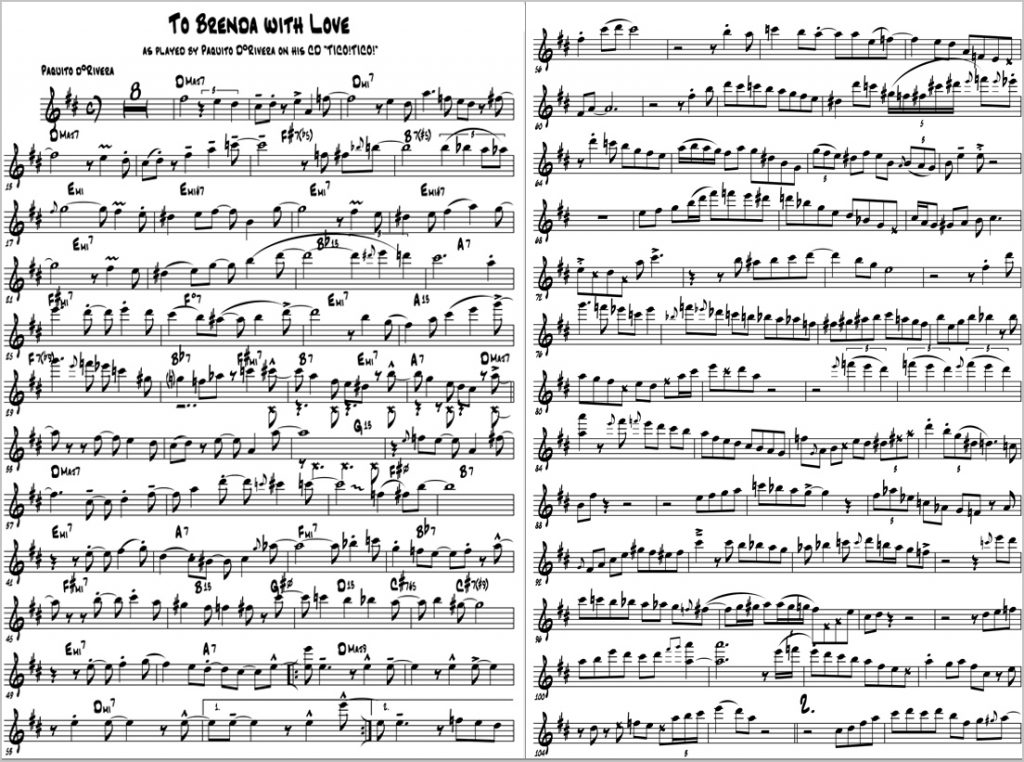
Listen to Paquito’s solo on To Brenda With Love
This song, composed by D’Rivera, clearly illustrates Paquito’s sensational abilities both as a composer and a soloist.
Paquito’s Book
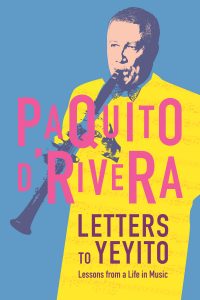
Letters to Yeyito: Lessons from a Life in Music by Paquito D’Rivera
A captivating memoir from one of jazz’s most beloved practitioners, fourteen-time Grammy winner Paquito D’Rivera’s Letters to Yeyito is a fascinating tour of a life lived in music, and a useful guidebook for aspiring artists everywhere.
Written with the imagination and trademark exuberance that D’Rivera has brought to his music, Letters to Yeyito combines the wildness and lyricism of Charles Mingus’s classic Beneath the Underdog with the heartfelt guidance and missionary zeal of Wynton Marsalis’s To a Young Jazz Musician, making for an immensely appealing read for music aficionados and casual listeners alike.
